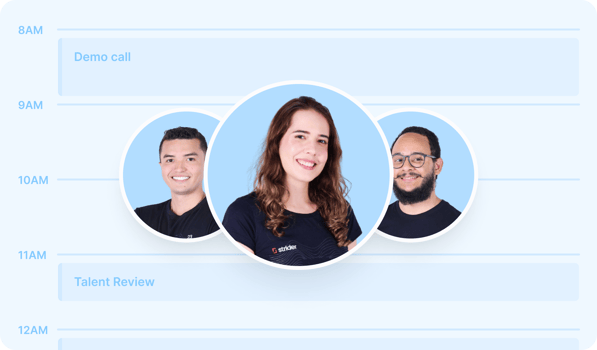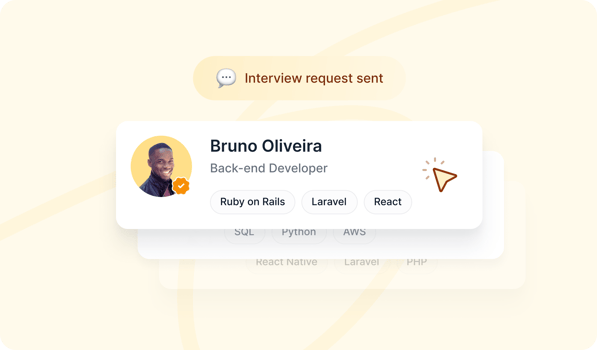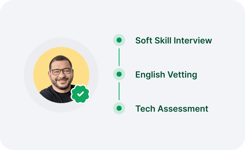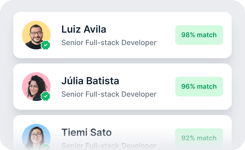Hire a Remote Python Developer
Python is a versatile, high-level programming language used for web development, data analysis, scientific computing, artificial intelligence, and more. Python is popular for its simplicity and ease of use. With a clear and concise syntax, Python code is beginner-friendly. It also has an extensive library of modules, which provide Python developers with pre-written code for a wide range of tasks, from handling complex math calculations to scraping websites for data.
Python has become an indispensable tool for businesses across a range of industries thanks to its flexibility and power. In finance, it supports data analysis, predictive modelling, and automation, helping companies streamline workflows and make data-driven choices. E-commerce platforms rely on Python to build reliable web apps, manage inventory, and create recommendation engines that improve user experiences. With Python, businesses can automate repetitive tasks, analyze massive datasets, and stay competitive. This is why so many companies look to hire Python developers. When hiring experts in Python development or bringing on a dedicated Python developer for long-term projects, look for someone with a strong track record in building scalable solutions. Their skills can help you streamline processes, optimize data handling, and build applications that grow with your business.
If you’re asking how to hire a Python developer, below, we will explore the key skills to look for when hiring Python developers, provide a list of the top interview questions, and address common concerns related to the hiring process. Whether you are building a web application, working on data analysis, or developing automation tools, hiring a skilled Python developer can make all the difference in the success of your project. Let's learn how to find and hire the best Python developers!
What to Look for When You Hire a Python Developers?
Technical Skills
Python developers must know how to code in Python and should be proficient in writing clean and efficient code in Python, with a strong understanding of the language's syntax, constructs, and best practices.
Python has a rich ecosystem of libraries and frameworks that are widely used in different application areas. A good Python developer should have experience working with core libraries such as NumPy, Pandas, or Scikit-learn, as well as popular web frameworks such as Django and Flask.
A solid foundation in data structures and algorithms is essential for building efficient and optimized programs. The concept of arrays, stacks, queues, linked lists, and trees, as well as algorithms for sorting, searching, and traversing data, must be at their fingertips as it sets the foundation to handle large volumes of data and perform complex computations with minimal resource usage.
Additionally, knowledge of cloud technologies such as AWS, Azure, or GCP is becoming more important for Python developers. They should be familiar with cloud infrastructure, services, and tools, and be able to deploy and manage applications in the cloud environment.
Algorithmic Thinking
Python developers should be able to approach problems in a structured and methodical way. They should be able to break down complex problems into smaller, more manageable tasks, and then come up with algorithms to solve each of these tasks. This requires a deep understanding of data structures and algorithms, and the ability to apply them to solve real-world problems.
Debugging and Troubleshooting
A Python developer with strong debugging and troubleshooting skills can save significant time and effort in fixing issues and improving the overall quality of the codebase.
To effectively debug and troubleshoot, a Python developer should be familiar with debugging tools such as pdb, PyCharm Debugger, and IPython Debugger. They should also know how to read error messages and use logging to track down issues. Furthermore, they should have experience in testing code and identifying potential areas of failure. This includes knowledge of various testing frameworks such as pytest and unit test.
Apart from the technical aspect of debugging, a Python developer with strong troubleshooting skills should also possess good problem-solving abilities. They should be able to approach a problem systematically, analyze and identify the root cause of the issue, and develop an effective solution. This requires the ability to break down complex problems into smaller, more manageable components and apply a logical approach to problem-solving.
Continuous Learning
Python is an open-source language that is continuously being improved and expanded upon by a large community of developers. New libraries, frameworks, and tools are constantly being developed, and it's important for Python developers to stay up-to-date with these developments in order to write efficient and effective code. Python developers who are continuously learning can also stay current with best practices and industry standards. As they gain new knowledge and skills, they can apply these to their work and improve the quality of their code.
Another reason why continuous learning is important for Python developers is that Python is used in a variety of industries and domains, from data science to web development to artificial intelligence. As a result, Python developers may need to learn new technologies and approaches depending on the specific project they are working on.
Version Control Proficiency
When you hire a Python developer, strong Git skills are essential for efficient teamwork and project success. A Python developer who understands version control will work seamlessly within teams, handling branching, merging, and conflict resolution effortlessly. Advanced Git practices, such as rebasing and cherry-picking, help keep the commit history clean and organized. Familiarity with GitHub or GitLab is a major asset, as these platforms offer essential tools like pull requests and issue tracking, making collaboration straightforward. Whether you hire a dedicated Python developer locally or hire offshore Python developers, proficiency in version control is a must for smooth code management and project transparency.
Database Management Skills
A strong grasp of database management is necessary for experts in Python development services for hire. Skilled Python developers understand when to use relational databases like PostgreSQL for structured data and NoSQL databases like MongoDB for more flexible needs. They’re also adept at indexing, query optimization, and using ORMs like SQLAlchemy or Django ORM, which streamline database interactions in Python. These skills are critical when you’re looking to hire Python developers for projects that require efficient, scalable data handling. A remote Python developer with this expertise can effectively create scalable applications, even when working with large datasets.
Understanding of Asynchronous Programming
For projects with high volumes of user requests, knowing how to use asynchronous programming effectively can set the best Python developers for hire apart. Libraries like Asyncio and Celery allow Python developers to handle tasks simultaneously, resulting in faster and more responsive applications. This skill is invaluable for anyone seeking to hire a Python developer to create high-performance, scalable applications. By leveraging async programming, your dedicated Python developer can build solutions that handle increased user loads without sacrificing performance, an important consideration when you’re looking to hire a remote Python developer for your next project.
UI/UX Awareness in API Design
If you’re aiming to hire a Python developer who will work on API design, choosing someone with a strong sense of UI/UX is vital. Developers with API experience know how to design intuitive interfaces, with consistent endpoint structures and easy-to-understand error messages. Familiarity with frameworks like FastAPI or Flask-RESTful and RESTful design principles give the Python developer the ability to create APIs that are simple for clients and team members to use. When you hire offshore Python developers, UI/UX awareness results in an API that is user-friendly and well-integrated, reducing integration challenges and improving user experience.
Experience with Automation and Scripting
Automation is another key area to consider when looking to hire Python developers. Python’s flexibility makes it ideal for automating repetitive tasks, whether through data extraction scripts or more complex DevOps workflows using tools like Jenkins or Ansible. Hire a Python developer with experience in automation to reduce errors and make processes more efficient. This is valuable for any business, especially when you hire a dedicated Python developer for long-term projects or hire a remote Python developer who can help streamline operations. By automating routine tasks, your Python developer hire can focus on higher-level challenges, adding real value to your projects.
Teamwork & Communication Skills
Python developers may work on complex projects that involve multiple team members, so clear and effective communication is essential to ensure that everyone is on the same page and that the project runs smoothly.
When you hire a Python developer, they must also be able to explain their thought processes and solutions to non-technical stakeholders, such as clients or project managers. This requires the ability to break down technical concepts into understandable natural language, and provide clear explanations that can be easily understood by those without a technical background.
A good Python developer must work collaboratively with other team members, including web developers, designers, project managers, and stakeholders. They should be able to contribute to a positive team culture and be willing to help others when needed.
Top 5 Python Developer Interview Questions
What experience do you have working with Python, and what are some of the projects you have worked on?
Asking about a developer's experience working with Python can reveal their level of proficiency in the language and the types of projects they have worked on in the past. It can also give you an idea of their interests and areas of expertise. You should also ask how long they have been using Python, what types of projects they have worked on, and what frameworks or libraries they are familiar with.
A good answer would look something like this:
"I have worked on a variety of projects, from web development to data mining and analysis. I've built web applications using Flask and Django, and I've also worked with libraries like NumPy and Pandas for data analysis and manipulation."
It clearly shows the developer has a lot of experience with Python and has worked on a variety of projects using the language. This could indicate that they are a versatile developer who is comfortable working on different types of Python projects together.
How do you manage dependencies in Python?
Understanding how to manage dependencies is an important skill for Python developers, particularly those working on larger projects or collaborating with others. It can help ensure that code runs correctly and efficiently, while also making it easier to share and reuse code.
There are several ways to manage dependencies in Python, but one of the most popular is using a package manager such as pip or conda. Pip is the default package manager for Python and can be used to install packages from the Python Package Index (PyPI), as well as from other sources such as GitHub. Conda, on the other hand, is a package and environment manager that can be used to install packages from a variety of sources, including PyPI, conda-forge, and Anaconda.
Understanding how to manage dependencies in Python can indicate a developer's experience with larger software projects and their ability to work collaboratively with others. It can also demonstrate their familiarity with Python's built-in package managers and their ability to troubleshoot issues related to package installation and compatibility. Additionally, using best practices such as including a requirements.txt file can indicate their attention to detail and their ability to write reusable and maintainable code.
Can you explain the difference between a list and a tuple in Python?
Understanding the differences between different types of data structures in Python is a fundamental skill for developers, particularly those who are new to the language. Knowing the differences between a list and a tuple can help developers choose the appropriate data structure for their specific use case, which can impact the performance and readability of their code.
An ideal response would explain that lists and tuples are both sequence data types, but they have some key differences. The most significant difference is that lists are mutable (modified after creation), while tuples are immutable (can't be modified). This means that if you need a data structure that can be modified, you should use a list, while if you need a data structure that cannot be modified, you should use a tuple.
How do you ensure the quality of your code, and what are some of the testing methodologies you use?
To ensure code quality, a developer can use various testing methodologies like unit testing, integration testing, functional testing, and acceptance testing. Ensuring code quality is crucial to building reliable and maintainable software, and testing is a vital aspect of that development process. Therefore, asking how a developer ensures the quality of their code and which testing methodologies they use can provide insights into their approach to software development, their understanding of software testing, and their ability to write high-quality code.
Can you walk me through the steps you would take to optimize a slow-performing Python script?
The candidate must provide a structured and thorough response to this question. One possible way to answer this question could use the following structure:
- Identify performance bottlenecks
- Analyze the bottlenecks to understand their causes
- Optimize the code to remove or mitigate the bottlenecks
- Test the performance improvements to ensure they meet the required performance standards
- Iterate and refine the optimizations until the script meets the desired performance level.
It's also important to balance performance with other factors like the code readability, maintainability, and scalability when making optimizations. The developer must have a systematic approach to problem-solving and should be able to break down complex tasks into manageable steps.







